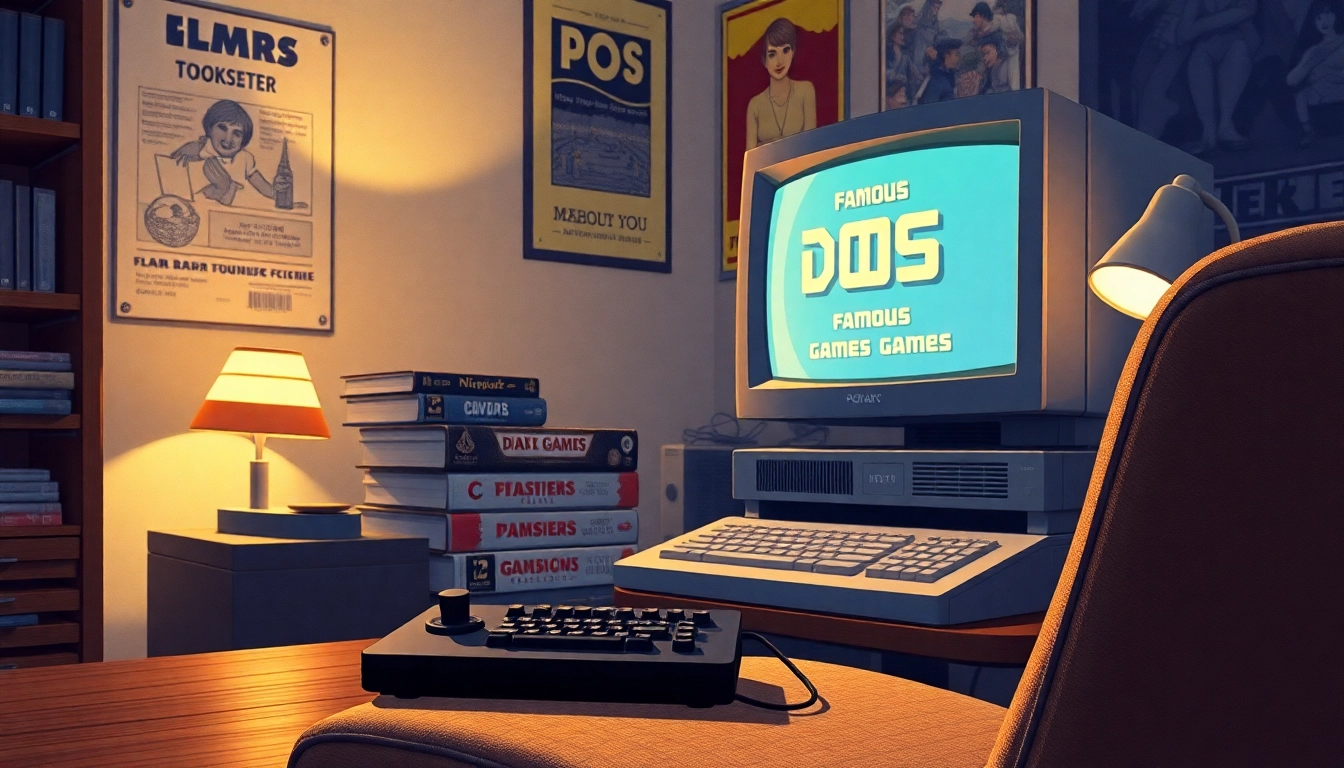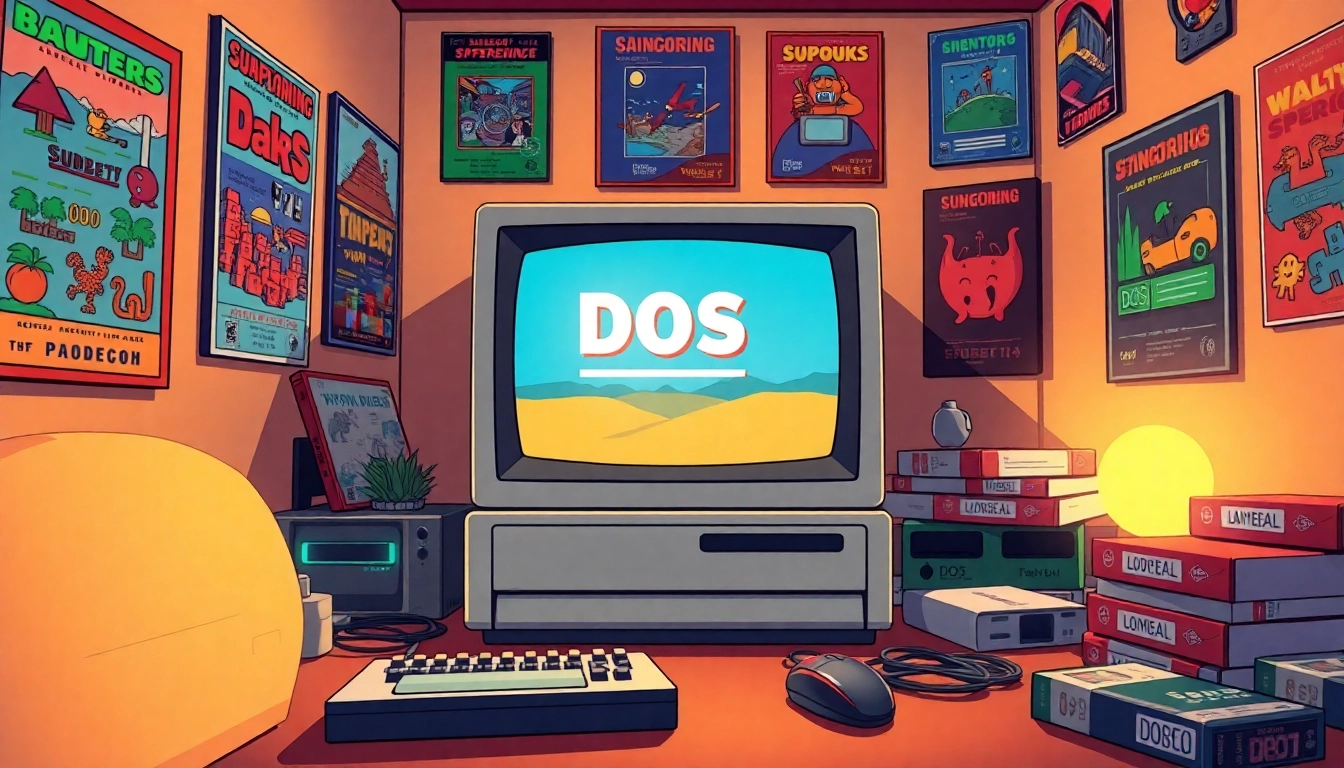Understanding DOS Games
What Are DOS Games?
DOS games refer to video games that were designed to run on the Disk Operating System (DOS), which was prominent in the early computing era of the 1980s and 1990s. These games were typically characterized by simple graphics, text-based interfaces, and minimal sound effects, relying heavily on user imagination and interaction. Unlike modern gaming consoles or advanced PC games, DOS games often featured pixelated graphics, basic animations, and sound synthesized through internal PC components. Despite their limitations, they laid the foundation for the gaming industry as we know it today.
The History of DOS Gaming
The rise of DOS games began in the late 1970s when personal computing started to take off. The demand grew for entertainment software, leading to the development of classic titles like Pac-Man and Doom, which became iconic representations of early gaming. Throughout the 1980s, as personal computers gained popularity, companies like Apogee Software and Id Software emerged, producing games that would define the genre. A pivotal moment in DOS gaming history was the introduction of graphical user interfaces, which allowed for more elaborate game designs and immersive experiences.
Key Features of DOS Games
DOS games are known for a few distinctive features that contributed to their unique identity:
- Text-Based Command Input: Many early DOS games required players to input text commands, offering a distinct gameplay experience.
- Pixelated Graphics: With limited graphical capabilities, these games often featured blocky, pixelated images that have a nostalgic charm today.
- Sound Effects: Sound in DOS games was typically generated through the PC speaker, giving rise to iconic retro soundscapes.
- Simple Gameplay Mechanics: Most DOS games focused on straightforward objectives, allowing players to easily grasp the mechanics without extensive tutorials.
Why You Should Play DOS Games
Reviving Nostalgia: A Trip Down Memory Lane
For many, playing DOS games is not just about entertainment; it encapsulates a cherished chapter of their childhood. The nostalgic value is immense, as it connects players to memories of simpler gaming experiences. The excitement of exploring virtual worlds, overcoming challenges, and competing against friends in the basement or living room has left an indelible mark on gamers. Replaying these classics helps revive those emotions, fostering a sense of authenticity and connection to the past.
Benefits of Playing Retro Games
Engaging with retro games, particularly DOS titles, comes with benefits that extend beyond nostalgia:
- Enhanced Problem-Solving Skills: Many DOS games require critical thinking and strategic planning, honing the player’s ability to tackle challenges effectively.
- Reduced Stress Levels: The simplicity of gameplay can lead to a calming experience, allowing players to unwind and enjoy a mental break from modern, fast-paced games.
- Improved Memory and Focus: Navigating through complex plots and sequences sharpens memory retention and focus, valuable skills applicable in real-life situations.
Modern Emulation Opportunities
With modern technology, accessing and playing DOS games has never been easier. Emulators such as DOSBox allow players to run DOS games on contemporary systems smoothly. These emulators replicate the DOS environment, ensuring that users can experience the titles as they were originally intended. Furthermore, various websites offer cloud-based services allowing players to play dos games directly in their browsers without additional setup hassle, significantly enhancing accessibility.
Best Platforms to Play DOS Games
Top Websites for Playing DOS Games
Numerous online platforms have been developed to cater to those interested in savoring DOS games. Here’s a look at some of the top choices:
- ClassicReload.com: A dedicated site that has preserved thousands of classic DOS titles ready to play online.
- PlayDOSGames.com: This site features a large collection of DOS games, enabling players to enjoy originals right in their browsers.
- DOS Zone: Offers a comprehensive library of DOS games, all free to play without any registration requirements.
Choosing the Right Emulators
For players interested in experiencing DOS games beyond online platforms, selecting the right emulator is crucial. DOSBox is the most widely recognized, allowing users to easily run a variety of DOS games. Its user-friendly interface and extensive online documentation simplify the setup process. Other emulators include VirtualBox and PCem, which can simulate more complex environments suitable for advanced users aiming for authenticity.
Comparing Free and Paid Platforms
When choosing where to play DOS games, players often face the dilemma of free vs. paid platforms. Free platforms provide abundant access to classic titles but may come with advertisements or limited features. Conversely, paid services often offer enhanced functionalities, including cloud saves, additional support, and fewer interruptions. The choice ultimately depends on the player’s preferences and gaming habits.
Tips for Playing DOS Games Online
System Requirements and Setup
Playing DOS games online is relatively straightforward, but users should ensure their devices meet certain requirements. Most browsers today can support emulators without the need for specialized hardware. However, players should keep their systems updated to avoid compatibility issues. If opting for DOSBox, checking files like config.txt for optimal setup will enhance the playing experience.
Common Issues and Troubleshooting
While playing DOS games can be enjoyable, players may encounter certain common issues:
- Lag or Slow Performance: This can typically be resolved by adjusting the emulator’s settings or closing other applications that consume system resources.
- Compatibility Problems: Some games may not run correctly due to their specific requirements. Researching compatibility forums can provide solutions or patches.
- Input Issues: If controls are unresponsive, ensuring that the configuration has correctly mapped the keyboard or gamepad is essential.
Saving Progress and Returning to Games
Many DOS games do not include an automatic save feature, creating challenges for modern players used to continuous progress. Using the features of emulators, players can utilize save states to preserve their game at any point. Some platforms also allow cloud saves, making it easier to return to games later, regardless of device.
Engaging with the DOS Gaming Community
Where to Find Friends and Players
The DOS game community is rich and vibrant, offering opportunities for connection through forums, social media, and dedicated gaming platforms. Websites like Reddit have active subreddits where enthusiasts discuss game strategies, share nostalgia, and suggest lesser-known titles worth playing.
Participating in Online Forums
Joining online forums dedicated to retro gaming or specifically DOS titles can lead to valuable discussions and gaming tips. Platforms such as Discord offer real-time interaction, while traditional forums can provide in-depth text discussions about games, methodologies, and histories.
Sharing High Scores and Achievements
Highlighting achievements in DOS games has become a fun way for players to engage with others. Many online communities encourage players to share high scores or personal achievements through leaderboards or social media challenges. This creates healthy competition and further enriches the gaming experience.















Leave a Reply